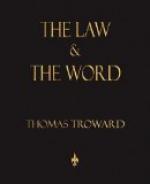This is just the mistake the Jews made, of building up theories on particular texts, and which Jesus corrected when he said: “Search the Scriptures, for in them ye think ye have eternal life, and these are they which testify of me” (John v, 39), or, as the Revised Version puts it: “Ye search the Scriptures because ye think that in them ye have eternal life; and these are they which bear witness of me,” which appears to be the better rendering. The words “ye think” is the key to the whole passage. He says in effect: “You fancy that eternal life is to be found in the book. It is not to be found in the book, but in what the book tells you about, and here I am as a living example of it.” It is just the same with everything else. No book can do more than tell you about a thing; it cannot produce it. You may study the cookery book from morning till night, but that will not give you your dinner.
What Jesus meant was, that we should read the Scriptures in the same way we should read any other book of practical instruction. First think what it is all about; then look at the nature of the general principles involved, and then see what instruction the book gives you for their practical application. Then go and do it. And remember also a further difference between reading about a thing and doing it. A book is for everybody, and can therefore, only give general instruction; but when you come to do the thing you will always find it works with some personal modifications,—not departures from the general principles you have read about, but specializations of them—and in this way you will learn much that is not to be got out of books, even the best.
I remember many years ago, when I was much younger, asking one of our leading water-colour artists,[3] how he would recommend me to study landscape painting, and he said: “Practise continually from Nature, and you will learn more than any one can teach you; that is how I have learnt, myself.” On the subject, then in question, he said just what Jesus did: “Here I am as a practical example of what I tell you.” And another thing is, that the more you think principles out for yourself and try to observe them in practice, the clearer the meaning of your book will become to you. I have a few excellent books on painting, but I had no idea how excellent they were when I first got them; practical experience has taught me to find much more in them than I did at first, for now I understand better what they are talking about. Well, that is the way to read the Bible, neither despising it as worthless tradition, nor treating the mere letter of it with superstitious veneration; both extremes are to be equally avoided. In fact the Bible tells us so itself: “The letter killeth, but the Spirit giveth life” (2 Cor. iii, 6); this, of course, does not mean that the letter can be tampered with, any more than a judge can alter the wording of a document put in evidence; it must be interpreted in the general sense of the document as a whole; and when the letter is thus vivified by the Spirit, it will be found fully to express it. But we require to enter into the Spirit of it first.




